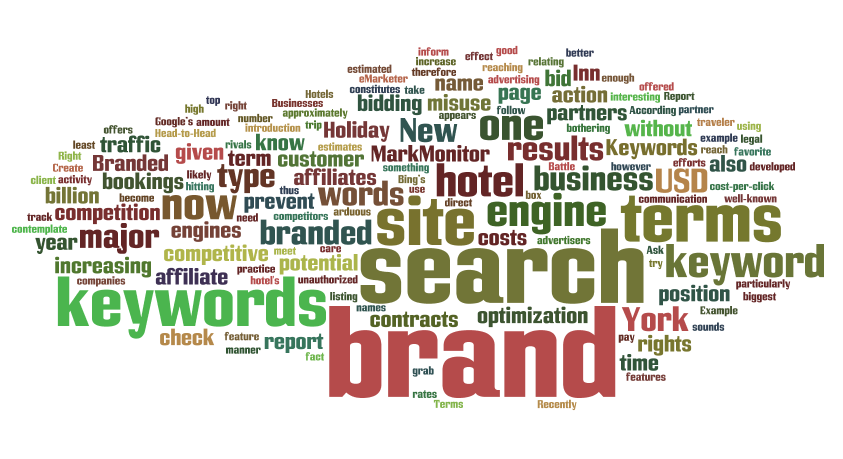Why You Shouldn’t Be So Brand Oriented

Now that all the brand strategists and old school marketers are out of the room, let’s take a look at what we mean. From an SEO standpoint, being brand centric can actually harm your ranking goals. Seems backwards, doesn’t it? It actually makes a lot more sense than you think. Here’s some issues we’ve seen about being brand oriented and how you can solve them:
Issue #1- Every page title contains the site/company name.
It makes sense to think that you’d want to have your company name in each page title. When building a brand identity, you want it to be front and center at all times. So why is this an issue? Anyone with a limited knowledge of SEO knows that you have a limited number of characters (generally 70) to add into a page title before web crawlers will stop reading it. By adding your site name or company name into the page title, you are taking up valuable real estate with essentially useless words.
Solution- Use all of those 70 characters to your advantage.
The reason adding your brand name is useless is because it already will be picked up by crawlers in other ways. The biggest one is usually the domain URL. However, as long as your brand name appears in the content of your site several times, Google will pick up on the correlation.
The rule of thumb is to utilize your page titles based on whatever you want to rank for. Chances are you already rank pretty well for your brand name. Furthermore, if people are direct searching your brand name, you’ve already succeeded.
If you are bored, take a look at Nike.com. They essentially break every page title optimization rule. Why? Because they can. People are direct searching their brand and clicking through the site. If this is how your website is, feel free to leave this page. For everyone else, take note.
Use those precious characters on giving context for what that page is about. Do a little keyword research to see how people search. From that, you can build your page titles.
Issue #2- Page titles contain your product names and brand centric keywords.
This issue goes hand in hand with the first issue. We’ve seen many companies that have page titles that are simply product names. This is great to push brand names, but unless your brand is a household name, this will not benefit you.
If you are a soap company, but no one’s ever heard of the Germ Annihilator 5000, you will not get direct searches for your product. If the page title only contains the product name, say “bye bye” to organic traffic.
Solution- Be humble.
Look at your brand as if no one has ever heard of it. Find generic keywords that explain your product. For the example above, you will want to use broad keywords like “soap” and long tail keywords like “anti bacterial soap with aloe.”
Many people think SEO is about tricking search engines. This is simply not true. What we do is give context to web crawlers so they know exactly what’s on the page they are crawling.
I’ve said this many times and I will say it again: Web crawlers want to be right 100% of the time. Google wants the best result for a user’s query to rank number 1. The more you have to search, the worse your experience is. To boost up these rankings, crawlers need to be confident in what’s on your page. Use the page title to tell them.
Issue #3- Steering away from keywords that ultimately are searched more.
It’s no secret that companies are very fickle when it comes to words they want associated with their brand. Let’s say you are a baker that makes great doughnuts. You want to sell them on your website, but hate the word “doughnut” and prefer the term “yeast ring”. You then change all of your SEO elements to replace “doughnut” with “yeast ring”. You realize you haven’t gotten any traffic to your “yeast ring” pages and can’t figure out why.
Solution- SEO based on how people search.
The answer is simple: People do not search for “yeast rings.” Regardless of how your company wants to market itself, you want to view it from the user’s eyes when building an internet marketing strategy. In this case, you sometimes have to bite the bullet and focus on the words that people search for.
If your company is completely against using certain words because you feel they reflect badly on your company, there are other options. One of the options that we have found success with is building comparison pages. For example, you can make a page titled “Our Yeast Rings vs. Normal Doughnuts.” Include “doughnut” related keywords throughout the content on the page. People will come to your page explaining why your yeast rings are better, and then be compelled to click through and ultimately purchase. In the end, that’s the goal.
Conclusion
We aren’t telling you to disregard your brand completely. In this case, do not look at SEOing as marketing, but as a roadmap for guiding people to your content. Once you view it this way, you realize your brand isn’t what’s most important.
Love your brand, love your customer more.
